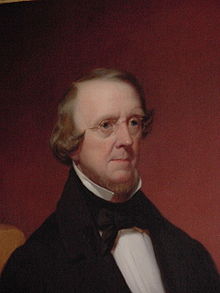Roger Sherman Baldwin
| Roger Sherman Baldwin | |
|---|---|
 |
|
| 32nd | |
| Governor of Connecticut | |
|
In office May 1, 1844 – May 6, 1846 |
|
| Lieutenant | Reuben Booth |
| Preceded by | Chauncey Fitch Cleveland |
| Succeeded by | Isaac Toucey |
|
United States Senator from Connecticut |
|
|
In office November 11, 1847 – March 4, 1851 |
|
| Preceded by | Jabez W. Huntington |
| Succeeded by | Isaac Toucey |
| Member of the Connecticut House of Representatives | |
|
In office 1837-1838 |
|
| Personal details | |
| Born |
January 4, 1793 New Haven, Connecticut |
| Died | February 19, 1863 (aged 70) New Haven, Connecticut |
| Political party | Whig, Republican |
| Spouse(s) | Emily Pitkin Perkins (October 25, 1820) |
| Children | Edward Law Baldwin Elizabeth Wooster Baldwin Rogers Sherman Baldwin Ebenezer Simeon Baldwin Henrietta Perkins Baldwin George William Baldwin Emily Frances Baldwin Ebenezer Charles Baldwin Simeon Eben Baldwin |
| Alma mater |
Yale College Litchfield Law School |
Not to be confused with Roger Nash Baldwin, 20th Century founder of the American Civil Liberties Union.
Roger Sherman Baldwin (January 4, 1793 – February 19, 1863) was an American politician who served as the 32nd Governor of Connecticut from 1844 to 1846 and a United States Senator from 1847 to 1851. As a lawyer, his career was most notable for his participation in the 1841 Amistad case.
Baldwin was son of Simeon Baldwin and Rebecca Sherman in New Haven, Connecticut. He was the maternal grandson of notable founding father Roger Sherman (the only person to sign all four great state papers of the U.S.: the Continental Association, the Declaration of Independence, the Articles of Confederation and the Constitution). He attended Hopkins School, and entered Yale College at the age of fourteen, and graduated with high honors in 1811. At Yale, Baldwin was a member of the Linonian Society. After leaving Yale he studied law in his father's office in New Haven, and also in the Litchfield Law School, and was admitted to the bar in 1814. Although repeatedly called into public office, he devoted himself through life to the profession of his choice, attaining the highest distinction, especially in the discussion of questions of law. His defense in 1841, of the rights of the Africans of the Amistad, is particularly celebrated, both for his ability and for the importance of the case.
...
Wikipedia
